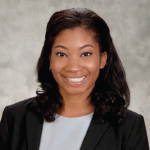Cheryl Alkon is a freelance medical writer based in Massachusetts.
Explore This Issue
July 2020A Student’s Perspective
Corinne Pittman, a 2021 MD candidate at Howard University College of Medicine, Washington, D.C., who has chosen to pursue otolaryngology, not only understands the difficulty facing future residents in the COVID-19 era, she knows there are additional challenges she might face as an underrepresented minority without a home otolaryngology residency program.
 “More than ever before, medical students without a home program are facing the prospect of applying to all otolaryngology programs to even have a fighting chance of being noticed,” she explained. “I also wonder how seeing a historically Black university like Howard on an application or receiving a letter from an alternate specialty instead of a well-known otolaryngology faculty will compare to those from institutions with residency programs.”
“More than ever before, medical students without a home program are facing the prospect of applying to all otolaryngology programs to even have a fighting chance of being noticed,” she explained. “I also wonder how seeing a historically Black university like Howard on an application or receiving a letter from an alternate specialty instead of a well-known otolaryngology faculty will compare to those from institutions with residency programs.”
Getting noticed in a sea of applicants during virtual sub-internships is difficult. “During Zoom conferences I began to wonder, ‘How can I possibly stand out in a crowd of over 100 medical students?’” Pittman said. “On the one hand, you want to make yourself heard, but nobody wants to be that medical student who accidentally interrupts the program director. My personal preference is to keep my video on and speak up when I have a question, to ensure that I am actively participating.
“While there are disadvantages as applicants without a home program, we must press forward selling our strengths,” she continued. “Together, we’re a unique population not only because of individual characteristics, but also our sheer grit, determination, and notable efforts to make certain the otolaryngology community is aware of our existence.”
Virtual Residency Training Resources
Besides the three otolaryngology consortia, many professional medical organizations have made their materials available for wider educational use. They include the following:
- The American Medical Association has offered free access to online modules for medical students, residents, and medical educators. Through Sept. 30, 2020, the AMA is giving medical schools access to its Health Systems Science Learning Series, and residency programs have access to six modules from the GME Competency Education Program.
- The American Academy of Otolaryngology–Head and Neck Surgery has made its home study course free to resident members through August 2020 and has a podcast, frequENTcy, that featured a recent COVID-19 series.
- The Headmirror free podcast ENT in a Nutshell gives brief clinical reviews by content experts followed by a summary and question set.
- The Society of Critical Care Medicine has a number of podcasts and online modules for non-intensivists to help them better understand critical care, with a focus on COVID-related topics.